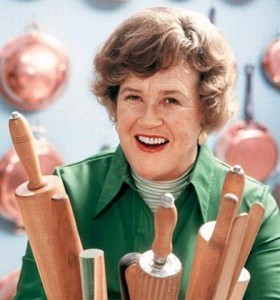Julia Child and the Value of Human Relations
 I think it's fitting that I write this as Julia Child's 100th birthday is being recognized. Lately, but coincidentally, I've become quite fascinated with Julia and the impact she (and others of her era) made on the food world. So, recently, I had an opportunity to read her book, "My Life in France" co-written with Alex Prud'homme and published in 2006, two years after her passing.
I think it's fitting that I write this as Julia Child's 100th birthday is being recognized. Lately, but coincidentally, I've become quite fascinated with Julia and the impact she (and others of her era) made on the food world. So, recently, I had an opportunity to read her book, "My Life in France" co-written with Alex Prud'homme and published in 2006, two years after her passing.
This book documents her years in France, where she learned to cook and also chronicles her evolution from budding chef to cookbook author to culinary media star. What I love about this book was not just the talk about food and how she developed as a chef, but also how her philosophy and "voice" can be heard in its pages. (Now, I have to say that so far I haven't read any of Julia's other books -- although I have one poised on my nightstand -- so maybe this is typical of Julia's books). I never had a chance to meet the woman, but through her book, I feel like I am getting to know the character that she was.
There was a passage that struck me early on in the book that I think we can all take a lesson from. Julia is discussing how shopping for food in Paris was a "life-changing experience." According to her, it was during these daily shopping excursions that she learned "one of the most important lessons of my life: the value of les human relations."
As she writes...
The French are very sensitive to personal dynamics, and they believe that you must earn your rewards. If a tourist enters a food stall thinking he's going to be cheated, the salesman will sense this and obligingly cheat him. But if a Frenchman senses that a visitor is delighted to be in his store, and takes a genuine interest in what is for sale, then he'll just open up like a flower. The Parisian grocers insisted that I interact with them personally: if I wasn't willing to take the time to get to know them and their wares, then I would not go home with the freshest legumes or cuts of meat in my basket.
I think Julia's experiences are something we can learn from today: that the connections we make with people are hugely valuable. People are more likely to treat us well if we treat them well to begin with. Think about it: have you ever had the occasion to be given a little extra attention, maybe been treated to an additional "something" (tangible or not) simply because you took the time to smile, be nice, maybe chat up the person you were dealing with? I've even had the experience of being upgraded to Business Class on a trans-Atlantic flight when I was holding a Coach ticket because I was friendly to the ticket agent when so many other passengers were surly and rude.
I believe whole-heartedly in treating others like they matter -- it's just part of my operating DNA. My kids have observed that "Mom, you just have a way of connecting with people." But it's not a trick and it didn't always come natural. It comes from practice. I know the names of most of the people at the grocery store I frequent. When I'm checking out, I ask them how THEIR day is (they are trained to ask me about mine as part of Customer Service). I smile and wave thank you to the flaggers directing traffic in construction zones. I compliment the vendors at our local Farmer's Market about their wares, the quality of their produce, or their displays. People appreciate it when you notice what they do or who they are. We all want to feel like we matter, like what we do and who we are is somehow important to someone else.
I don't have any agenda or ulterior motive for doing it. I just genuinely like and value other people. We all need one another and really, life is better when we can be cordial and caring. Julia was known for being brash and rough at times, and definitely had an opinion, but she also worked very hard to feed people's bodies and souls. I think the takeaway from her message onles human relationsis that if we expect to GET the best, we have to be willing to GIVE the best. Certainly when we do take the time to connect with people, to be kind, to be...well, just NICE, it doesn't guarantee that people will respond in kind. But, by doing our best to "Treat Others the Way You Want to Be Treated," we can guarantee that we have done our part. And, if others don't match that,tant pis,as Julia would say. Too bad.
---
Did you like this? Find more lessons on the importance of human relations in It's Not Who You Know, It's How You Treat Them -- available both in print and in ebook form. Follow this link (http://www.ItsNotWhoYouKnowBook.com) for details and ordering information.



